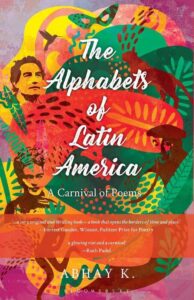
‘The Alphabets of Latin America‘

Bath: The University of Bath organized a panel discussion on Bihar-born Indian poet-diplomat Abhay K.’s poetry collection The Alphabets of Latin America today. The topic of the discussion was New Alphabets: Building a Poetic & Critical Dialogue between Latin American and South Asian Thought.
The participants included Jessica Sequeira, a scholar at the University of Cambridge and Jorge Heine, research professor, Pardee School of Global Studies, Boston University, and former Chilean ambassador to India, and poet-diplomat Abhay K.
Abhay K. is the author of ten poetry books including Monsoon (Sahitya Akademi, 2022) and editor of several books including The Book of Bihari Literature(HarperCollins 2022). He received SAARC Literary Award in 2013.
 Jessica Sequeira commenting on the discussion said – “We take Abhay K.’s recent book of poems The Alphabets of Latin America: A Carnival of Poems as a starting point to discuss possibilities and challenges of intercultural conversation between Latin America and India. How to go beyond the cliché of ‘building bridges’, avoiding pitfalls of orientalism, exoticism and facile universalisms, and including both appreciative and critical elements? What are the possibilities of poetry to explore culture? Abhay K.’s book of poems, with its lyrical travelling ‘I’, evokes places, people, religious traditions and politics in Latin America. Abhay notices details, makes surprising comparisons (‘I am Krishna from the Dwapar age / I have come to see the Rasa Lila in Rio’) and shows a wry sense of humour in formatting and observation. Literary form shifts with the theme, even as personal experiences inform the text (‘This fresh, green, perfect calabash I have/purchased today at the market in Brasilia / reminds me of calabashes growing on my mother’s thatched roof in Bihar’). The dictionary-like format, with alphabetical entries, playfully subverts colonialists’ cataloguing tendencies. To alphabetize poems removes them from geographical grouping to create unexpected juxtapositions, ‘Nazca Lines’ next to ‘Neruda’. Embedded quotations (e.g. ‘The afternoon wind comes and goes between India and Brazil tirelessly’ —Cecilia Meireles) serve as spurs to lateral thought.”
Jessica Sequeira commenting on the discussion said – “We take Abhay K.’s recent book of poems The Alphabets of Latin America: A Carnival of Poems as a starting point to discuss possibilities and challenges of intercultural conversation between Latin America and India. How to go beyond the cliché of ‘building bridges’, avoiding pitfalls of orientalism, exoticism and facile universalisms, and including both appreciative and critical elements? What are the possibilities of poetry to explore culture? Abhay K.’s book of poems, with its lyrical travelling ‘I’, evokes places, people, religious traditions and politics in Latin America. Abhay notices details, makes surprising comparisons (‘I am Krishna from the Dwapar age / I have come to see the Rasa Lila in Rio’) and shows a wry sense of humour in formatting and observation. Literary form shifts with the theme, even as personal experiences inform the text (‘This fresh, green, perfect calabash I have/purchased today at the market in Brasilia / reminds me of calabashes growing on my mother’s thatched roof in Bihar’). The dictionary-like format, with alphabetical entries, playfully subverts colonialists’ cataloguing tendencies. To alphabetize poems removes them from geographical grouping to create unexpected juxtapositions, ‘Nazca Lines’ next to ‘Neruda’. Embedded quotations (e.g. ‘The afternoon wind comes and goes between India and Brazil tirelessly’ —Cecilia Meireles) serve as spurs to lateral thought.”
Prof. Jorge Heine shared—“Octavio Paz, the Mexican Nobel Prize winner, is in that category as well. Both Paz and Neruda (who are on the cover of The Alphabets of Latin America) had a strong connection with India, and Paz’s book, In Light of India, is an extended meditation on Indian civilization. Ambassador Abhay steps into that distinguished tradition of poet-diplomats, conveying his sharp observations about Latin America—from Bahia to Belmopan. In a few lines, he conveys so much about what makes the lands of magical realism tick—its geography, its cities, its literature, its politicians and even its drinks. I have been to most if not all the places he writes about and I was struck by the accuracy of Abhay’s observations, his writer’s eye, and his knack for capturing the essence of a place in a few lines. How do you convey the sheer, overwhelming, numbing diversity of “Nuestra América “ as José Martí used to say, or “la América morena”, the term I prefer, in a short book of poems? Abhay’s solution was brilliant: by means of the alphabet, using it for countries, politicians, and writers, and take it from there.”
Abhay K. said that he was delighted that his poetry collection The Alphabets of Latin America was receiving global attention.
The book has already been translated and published into Italian and has been reviewed in leading global literary journals such as World Literature Today, Agenda UK, and Beltway Poetry USA among others. It has been translated into Spanish and Malayalam as well.
– global bihari bureau





